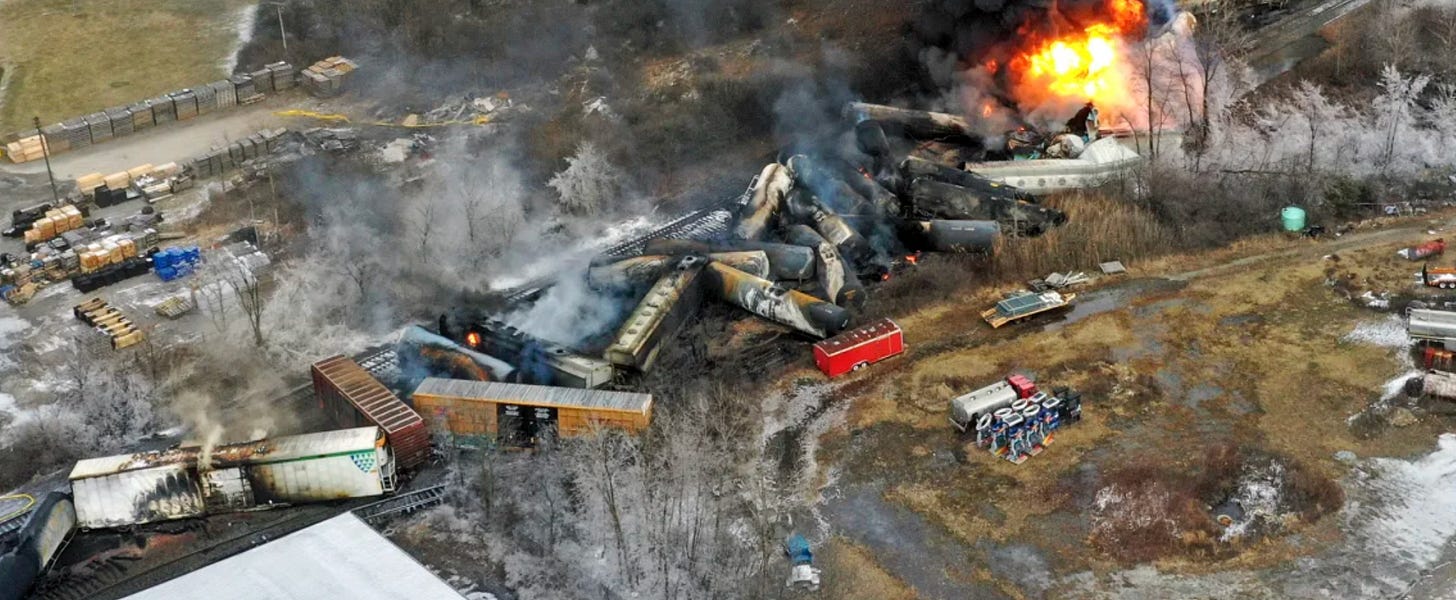Life Is Not Really Normal in East Palestine
Two years after a train derailment caused a chemical spill, residents still worry about the future.
On the evening of February 3, 2023, a Norfolk Southern train carrying toxic chemicals derailed in East Palestine, Ohio. Before the crash, defect detectors on the tracks about 30 miles outside of East Palestine indicated that a wheel bearing was overheating. At about 20 miles before East Palestine, another defect detector indicated the bearing temperature was 103 degrees hotter than the surrounding air.
Norfolk Southern policy states that a bearing has to be at least 115 degrees hotter than the outside temperature before a train must be stopped and inspected. So the train kept going, but it didn’t get far.
As the Norfolk Southern train made its way into the rural community of East Palestine, local video captured what looked like a rear axle on fire. Soon, more than half of the train’s 51 cars derailed. Giant plumes of smoke rose from train cars carrying vinyl chloride, a chemical used to make PVC pipes and other plastics.
Emergency crews decided to conduct a slow burn to avoid an explosion (which was later deemed unnecessary by the NTSB). As the fires burned, hydrogen chloride and phosgene entered the air. Exposure to hydrogen chloride causes skin, eye, nose and throat irritation. Phosgene produces a strong odor that can cause vomiting, breathing trouble and lung damage. It was used as a chemical weapon in World War I.
Immediate Aftermath
Residents within a one-mile radius of the crash site were evacuated from their homes. Not long after the derailment, some East Palestine residents began to experience symptoms like those caused by the chemicals that escaped into the air. Reports of headaches, rashes, persistent coughs and bronchitis popped up in and around East Palestine. A nurse at a hospital in nearby Columbiana, Ohio, told NBC News after the crash she was seeing about 10 people a day complaining of issues that she chalked up to “exposure to potentially hazardous chemicals.”
People in East Palestine and nearby towns in Ohio and Pennsylvania confronted leaders of the EPA, Norfolk Southern and the government about a lack of transparency. They worried about long-term health issues and the fate of their neighborhoods. Was it safe to send their children to school? Go to work? Plant a garden? Drink the water?
During one town hall meeting in East Palestine in February of 2023, a lifelong resident, Jim Stewart, chastised Norfolk Southern’s CEO Alan Shaw. “Did you shorten my life now? I want to retire and enjoy it. How are we going to enjoy it? You burned me,” Stewart groused at Shaw. “You’ve made me an angry man.”
According to CNN, “Shaw apologized and vowed to make it right through proper cleanup and reimbursing residents. But residents left the town hall feeling frustrated after many of their questions went unanswered, despite their repeated attempts to get clarity on safety measures.”
Two Years Later
Vice President JD Vance visited East Palestine on the two-year anniversary of the train derailment. He praised ongoing efforts to ensure the well-being of the community but said more must be done.
“Now, what we're worried about is finishing this cleanup and getting this community back on the path to economic prosperity,” Vance said. He also promised to hold Norfolk Southern accountable.
"I think we can do a lot better at assuring that when you have a terrible train disaster, like the one that happened in East Palestine, the railways actually pick up the tab," Vance said. "As much as I'm inspired and gratified by the resiliency of this community, I heard a lot about Norfolk Southern making promises to this community that it didn't keep."
Norfolk Southern says it has been supporting the community since the derailment. According to a page on the company’s website, Norfolk Southern has been actively involved in site remediation, provided resources to the community through its Family Assistance Center and distributed more than $300,000 in grants to Eastern Ohio and Western Pennsylvania organizations as part of its Safety First and Thriving Communities grant programs.
Earlier this year, Norfolk Southern agreed to pay a $22 million settlement to East Palestine, with an additional $25 million pledge for improvements to East Palestine City Park. But a new lawsuit filed on Feb. 3, 2025, claims that people died as a result of the dangerous chemicals that leaked after the derailment.
According to the Associated Press, “The newly filed lawsuit contains the first seven wrongful death claims filed against Norfolk Southern railroad — including the death of a 1-week-old baby. It also alleges the railroad and its contractors botched the cleanup while officials at the EPA and the Centers for Disease Control and Prevention signed off on it and failed to adequately warn residents about the health risks. Many of the other parties in the lawsuit cite lingering, unexplained health problems along with concerns something more serious could develop.”
Health monitoring has been ongoing since the accident and will likely continue for some time. Last year, the White House awarded new funding to the University of Kentucky’s East Palestine Health Tracking Study. It follows resident health and environmental concerns related to the chemical spill. “These chemicals definitely cause acute reactions [in individuals] — upper respiratory, even lower respiratory effects, rashes, dizziness, headache. But they can also have long-term consequences,” said Dr. Erin Haynes, chair of the UK College of Public Health Department of Epidemiology and Environmental Health. “We don't know what the consequences of this particular one will be. That's why we need to monitor closely. But cancer is definitely on the possibility list."
She also noted that high levels of PTSD were found within the community. The East Palestine Resiliency Center opened in 2024 to assist people suffering from emotional and mental trauma as a result of the train derailment. Two emergency response grants and financial assistance from Norfolk Southern were used to launch the Resiliency Center, which is located in nearby Unity Township.
According to the Morning Journal News, “The center’s services include mental health and substance use disorder treatment, EMDR (eye movement desensitization and reprocessing) therapy, counseling (individual, family, and group), support groups, educational sessions, meditation, yoga, tai chi, creative arts therapies, chair massage, pet therapy with Cedric the therapy dog, culinary art therapy and computer stations for vocational and navigator assistance. The center also features a space for children to work through the residual effects that still linger in the derailment’s wake.” Services are free to first responders and anyone who worked or lived in the community and was adversely affected by the train derailment.
Research on the impacts of the 2023 incident conducted at the University of California San Diego likens what many residents continue to experience to Gulf War Illness. These symptoms include fatigue, muscle weakness, cognitive problems and respiratory issues. According to the research data, anxiety, headaches, low energy, muscle pain and sleep problems also rank high among affected residents.
How long will these symptoms last? And might they lead to more serious health complications? That is what researchers will continue to study. In the meantime, resources like local doctors’ offices and the East Palestine Resiliency Center provide services to keep the community as healthy in mind and body as they possibly can.







As an Ohioan, we should all be concerned about the incident in East Palestine. It could have happened anywhere along the route that train took, from where the train entered the state to the west, in Toledo, across through either Sandusky or Fremont (where I live just blocks from the train line), to the east through Mansfield or other cities. Ohio has over 9000 miles of railroad tracks, and many times hazardous chemicals are carried on them. Hazmat trucks must take specific routes, but hazmat trains are simply marked, and as we learned in East Palestine, many times the first responders don't know what is on board. Even the state officials were not clued into the best way to respond to the East Palestine incident (the controlled demolition was not the best response) and more damage was done after they acted. And sadly, people who turned to the government, state or federal, for help have been very disappointed.